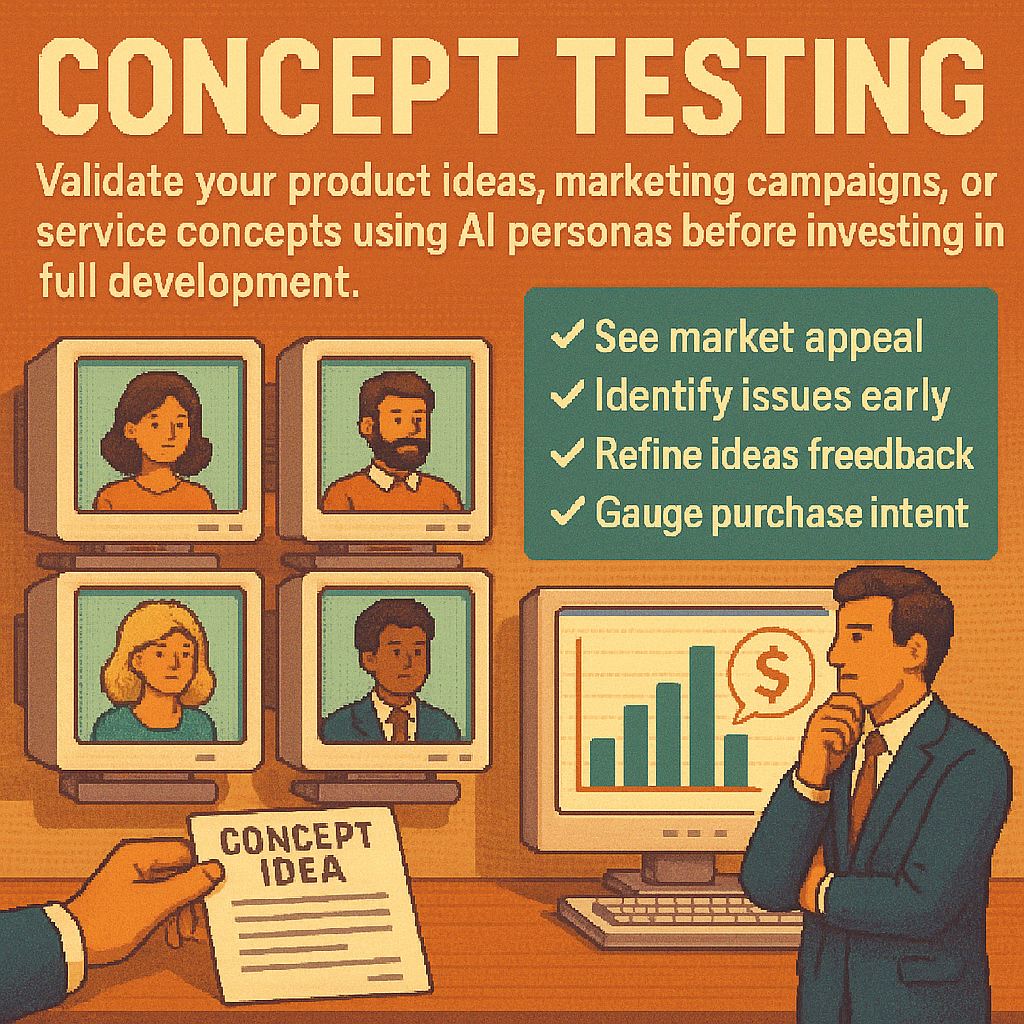Concept Testing
Validate your product ideas, marketing campaigns, or service concepts using AI personas before investing in full development. This synthetic research approach reveals which concepts resonate with your target market, identifies potential issues early, and helps you refine ideas based on consumer feedback. Get instant insights into market appeal and purchase intent without the cost and complexity of traditional concept testing with real respondents.

What is it Used For?
Concept testing evaluates consumer response to new ideas before they hit the market, helping businesses avoid the 95% failure rate that plagues new product launches. This market research methodology validates product concepts by measuring appeal, uniqueness, and purchase intent among target audiences. Companies use concept testing to screen multiple product ideas and identify winners before investing in development, test different positioning strategies and messaging approaches to find what resonates most strongly, evaluate packaging designs, logos, and brand elements to ensure they communicate the right message, assess new service offerings or feature concepts before building them, validate pricing strategies and understand price sensitivity for new concepts, and reduce the risk of costly market failures by catching problems early in the development process. The methodology works particularly well for consumer goods, technology products, service concepts, marketing campaigns, and any situation where you need to choose between multiple creative or strategic directions.
Real-World Example
When I was running my agency, we worked with one of the major food manufacturing companies on something I didn't initially realize they did - testing completely new product concepts before they existed. They would come up with new ice cream flavors and types they'd never tried before, and we'd help them understand if there was actually a market for these ideas.
Our approach was ingenious but expensive. We'd create Facebook ad campaigns featuring these hypothetical ice cream products, working with creative agencies to develop different brand identities and packaging designs. We'd test multiple variations to see which concepts generated the most interest and clicks from potential customers.
The tricky part was that when people clicked through the ads, they'd land on a "not currently available" page on the website. We had to create completely fake brand names for these tests because the company couldn't risk associating their main brand with products that didn't exist - imagine the reputation damage if customers thought they were being deceived.
The results were eye-opening. Some concepts performed 2-3 times better than others, clearly indicating which directions had real market potential. But this validation came at a steep cost - we were spending $200-300 per variation, and comprehensive tests often ran $10-20,000 total.
The winning concepts from our Facebook tests would then move to the next phase - taste testing and other traditional research methods. The digital concept testing served as an effective filter, helping the company invest their R&D resources in the most promising directions.
Looking back, this process could be revolutionized with AI personas. Instead of spending thousands on Facebook ads and risking brand reputation, companies could now test unlimited product concepts with synthetic audiences, get detailed feedback on appeal and purchase intent, and iterate rapidly without any financial risk or brand exposure.
How to Conduct This Research in Ask Rally
Step 1: Define Your Concept Clearly
Create a detailed description of your product, service, or campaign concept. Include key features, benefits, target market, and positioning. Develop visual representations when possible - mockups, packaging designs, or campaign materials that help personas understand your concept.
Step 2: Generate Your Target Audience
Create AI personas that match your ideal customer profile. Consider demographics, psychographics, usage behaviors, and purchase patterns. For comprehensive testing, generate 100-500 personas across different segments to capture market diversity.
Step 3: Present Your Concept Consistently
Share your concept description and visuals with personas in a standardized format. Ensure each persona receives the same information to maintain testing validity. Include enough detail for informed feedback without overwhelming with unnecessary complexity.
Step 4: Test Core Concept Metrics
Measure the fundamental elements that predict market success: overall appeal and liking, uniqueness compared to existing alternatives, believability and feasibility, relevance to personal needs, and purchase intent at different price points. Ask personas to explain their reasoning to understand the drivers behind their responses.
Step 5: Compare Multiple Concepts
If testing several concepts, use either monadic testing (each persona sees one concept) or sequential monadic testing (each persona evaluates all concepts). Sequential monadic is more efficient but monadic provides deeper, unbiased feedback on individual concepts.
Step 6: Analyze Feedback Patterns
Look for concepts that score high on multiple dimensions - appeal, uniqueness, and purchase intent. Identify which features or benefits drive positive responses and which create resistance. Segment results by persona characteristics to find your strongest target audiences.
Step 7: Refine Based on Insights
Use persona feedback to iterate on weak concepts. Test refined versions to validate improvements. Focus development resources on concepts with the strongest overall performance and clearest path to market success.
Step 8: Validate with Follow-up Testing
For winning concepts, conduct deeper testing on specific elements like pricing, messaging, or packaging. Use insights to guide real-world validation studies with smaller samples of actual customers.
Starter Prompt Template
Use this prompt template to get started with concept testing in Ask Rally:
Stay Updated
Subscribe to our newsletter to get notified about new articles and updates.
